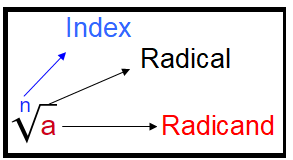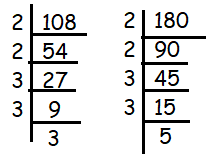SIMPLIFY RADICAL EXPRESSIONS
Subscribe to our ▶️ YouTube channel 🔴 for the latest videos, updates, and tips.

If n is even number, then nth root of the negative number is not real.
- If we have square root, for every two values or variables inside the square we can take one out of it.
- If we have cube root, for every three values or variables inside the cube root, we can take one out of it.
- If we have fourth root, for every four values or variables inside the fourth root, we can take one out of it.
Simplify the radical expression using the definition.
Example 1 :
√(4(y - 1)2)
Solution :
= 2|y - 1|
Example 2 :
∛(-8x3y6)
Solution :
Example 3 :
5th root (2x - 1)5
Solution :
Example 4 :
∜(16x8)
Solution :
Example 5 :
∛(-27x3)
Solution :
Example 6 :
∜(16a12y2)
Solution :
Example 7 :
√x / ∛x
Solution :
Example 8 :
√(∛x)
Solution :
Example 9 :
√(x + 7)√(x - 7)
Solution :
= √(x + 7)√(x - 7)
= √(x + 7)(x - 7)
Here (x+7)(x-7) looks like (a + b) (a - b) = a2 - b2
= √(x + 7)(x - 7)
= √(x2 - 72)
Example 10 :
√50
Solution :
= √50
Decomposing 50 into prime factors, we get
= √(5 ⋅ 5 ⋅ 2)
= 5√2
Example 11 :
Add or subtract the following radicals. Write answers in simplified form.
|
a) 4√3 - 2√3 b) 4√10 + 6√10 - √10 + 2 c) 4√x + √x d) 3√y - 6√y |
e) √x + √y + x + 3√y f) 6√7 - 8√7 g) 12√15 + 5 √15 - 8√15 h) 7√108 - 6√180 |
Solution :
a) 4√3 - 2√3
Subtracting these two, we get
= 2√3
b)
= 4√10 + 6√10 - √10 + 2
= 10√10 - √10 + 2
= 9√10 + 2
c)
= 4√x + √x
= 5√x
d)
= 3√y - 6√y
= - 3√y
e)
= √x + √y + x + 3√y
= √x + x + √y + 3√y
= √x + x + 4√y
f)
= 6√7 - 8√7
= -2√7
g)
= 12√15 + 5√15 - 8√15
= 17√15 - 8√15
= 9√15
h)
= 7√108 - 6√180
Decomposing 108 and 180.

= 7√(2 x 2 x 3 x 3 x 3) - 6√(2 x 2 x 3 x 3 x 5)
= 7 x 2 x 3√3 - 6 x 2 x 3 √5
= 42√3 - 36√5
Example 12 :
Rationalize the denominators and simplify (assume all variables represent positive real numbers).
|
a) 15/√5 b) √32a5 b3/√2ab2 c) 2/(3 + √5) d) (2 + √5)/(6 - √3) |
e) (1 + √2)/(3 + √5) f) √18a3√18a3 g) √0.121 h) (1 + √0.01)/(1 - √0.1) |
Solution :
a) 15/√5
Multiplying the numerator and denominator by √5, we get
= (15/√5) ⋅ (√5/√5)
= 15√5/5
= 3√5
b) √32a5 b3/√2ab2
= √(2 ⋅ 2 ⋅ 2 ⋅ 2 ⋅ 2 ⋅ a5 ⋅ b3)/√2ab2
= 4a2b√(2ab)/b√2a
= 4a2b√b
c) 2/(3 + √5)
= [2/(3 + √5)] ⋅ [(3 - √5) / (3 + √5)]
= 2⋅ (3 - √5) /(3 + √5) (3 + √5)
= (6 - 2√5) / (32 - √52)
= (6 - 2√5) / (9 - 5)
= (6 - 2√5) / 4
= (3 - √5) / 2
d) (2 + √5)/(6 - √3)
= (2 + √5)/(6 - √3) ⋅ [(6 + √3) / (6 + √3)]
= (2 + √5)(6 + √3) / (6 - √3) ⋅(6 + √3)
= (12 + 2√3 + 6√5 + √15) / (62 - √32)
= (12 + 2√3 + 6√5 + √15) / (36 - 3)
= (12 + 2√3 + 6√5 + √15) / 33
e) (1 + √2)/(3 + √5)
= (1 + √2)/(3 + √5) ⋅ [(3 - √5) / (3 - √5)]
= (1 + √2)(3 - √5) / (3 + √5)(3 - √5)
= (3 - √5 + 3√2 - √10) / (32 - √52)
= (3 - √5 + 3√2 - √10) / (9 - 5)
= (3 - √5 + 3√2 - √10) / 4
f) √18a3√18a3
= √(18a3 ⋅ 18a3)
= 18a3
g) √0.121
= √0.121 ⋅ √(1000/1000)
= √(0.121 ⋅ 1000)/√1000
= √121/√1000
= 11/10√10
= 1.1/√10
h) (1 + √0.01)/(1 - √0.1)
= (1 + √0.01)/(1 - √0.1) [(1 + √0.1)/(1 + √0.1)]
= (1 + √0.01)(1 + √0.1) / (1 - √0.1)(1 + √0.1)
= (1 + √0.1 + 0.1 + 0.1/√10) / 0.9
= (1.1 + √0.1 + 0.1/√10) / 0.9
Subscribe to our ▶️ YouTube channel 🔴 for the latest videos, updates, and tips.
Recent Articles
-
Finding Range of Values Inequality Problems
May 21, 24 08:51 PM
Finding Range of Values Inequality Problems -
Solving Two Step Inequality Word Problems
May 21, 24 08:51 AM
Solving Two Step Inequality Word Problems -
Exponential Function Context and Data Modeling
May 20, 24 10:45 PM
Exponential Function Context and Data Modeling